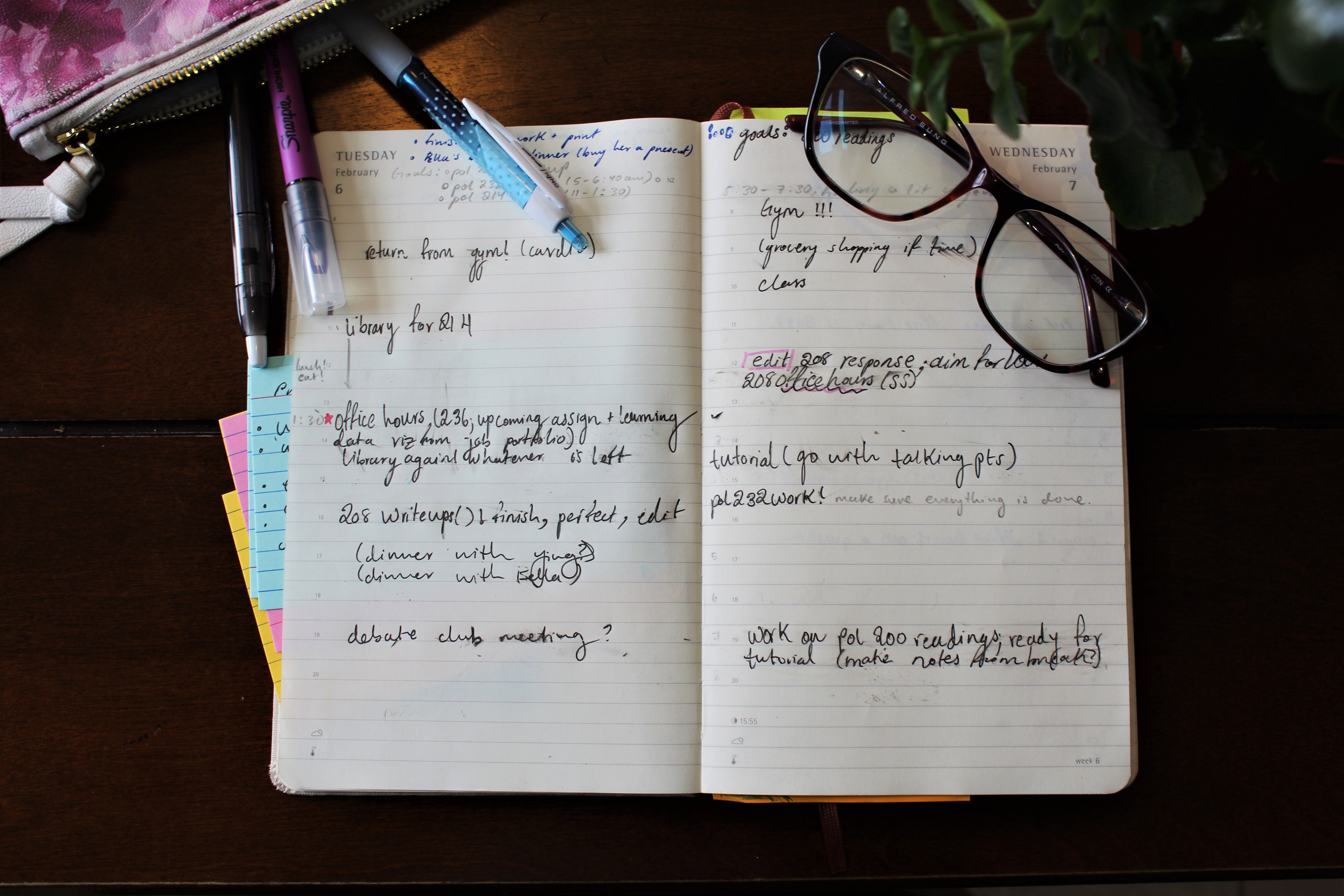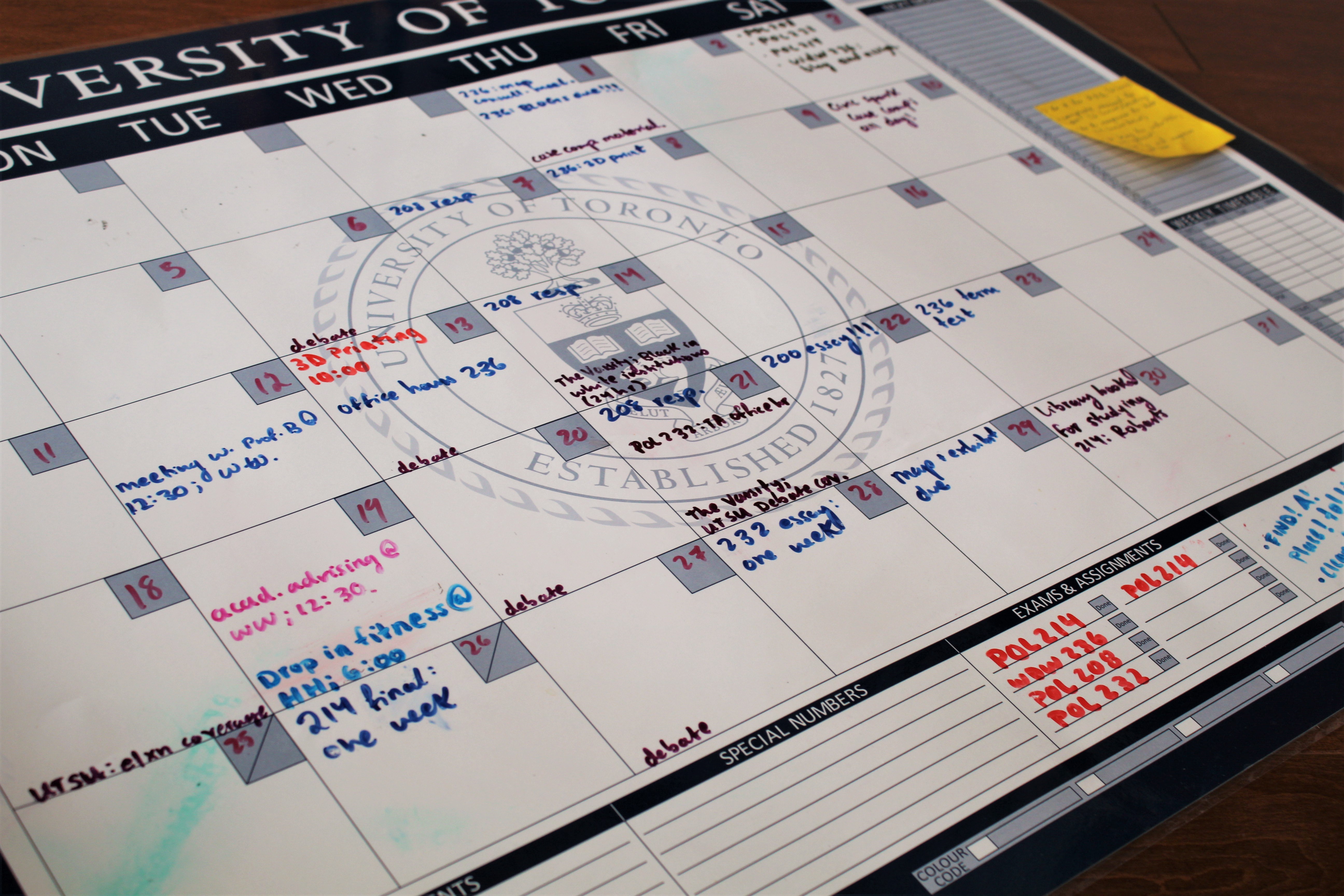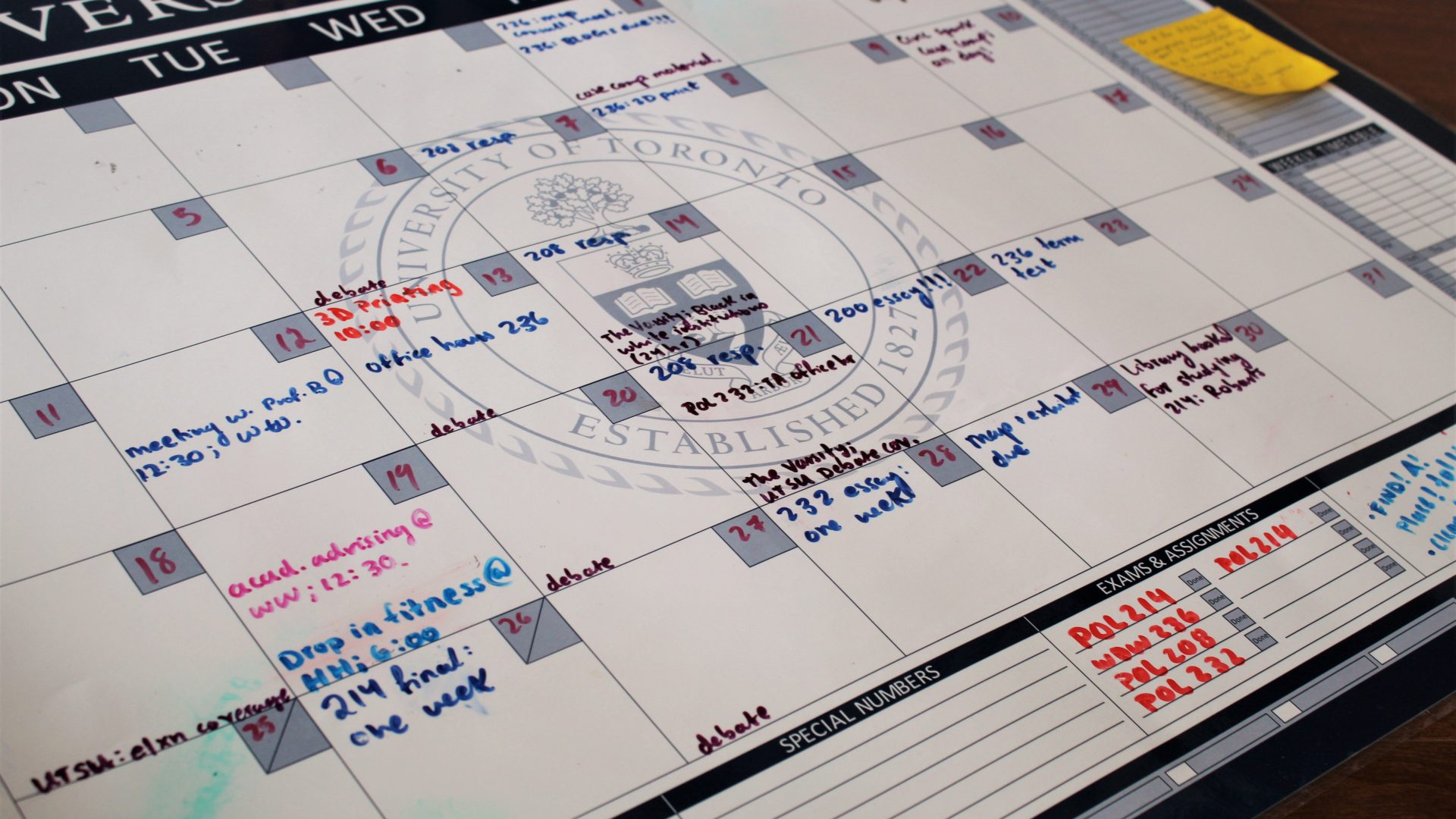
With course selection on the horizon, I thought I’d introduce myself with a post about how I use planning as a tool to minimize my anxiety when school is in full swing. After two years at U of T, involving switching programs, I am going into my third year in political science. From the nights I spent cramming chemistry notes, and the panic associated with handing in assignments at 11:58pm, I quickly learned that I need an itemized plan to guide me through these tasks. Breaking projects down into digestible chunks, for example, helped me tackle daunting essays and unfamiliar assignments. The key to my process is efficiently organizing my time so that when deadlines roll around, they feel less like a looming threat and more like achievable goals.
Why I spend so much time planning
The constant buzz of deadlines and tests left me with an unhealthy amount of stress in first-year. Entering second year, I shifted my approach to preparation. It now involves gathering information about courses, clubs, policies, and resources, and organizing it so I have an easy reference when I’m busy. Currently I have 3 notebooks in use on One Note: one for my tentative timetable, another for potential extra-curriculars, and the last for lists. This type of planning has less to do with academic work, but more on life stuff so I have sufficient time to spend on assignments. How well I do in school is based on more than class work; diet, lifestyle, and my social life are the key factors in determining my mental well-being and academic success, something my academic adviser at Woodsworth has repeatedly told me (now if only I'd listened the first time I could've avoided a lot of mistakes).
 My Plan
My Plan
A good plan is flexible. I may make extensive lists and schedules, but I’m never married to them. Even my timetable is fluid because I leave open space wherever I can in case I need to make a change or add something. I start with the obvious – allocating time to classes and tutorials. The key to a good timetable is dedicating chunks of valuable time for readings, homework, and assignments. For second-year political science courses, I accounted on average 3 hours per class per week for readings, and 2 hours for essay work.
Making time for the important things
After first year, I realized I hadn’t spent enough time branching out and being social, instead resting in the safe arms of my comfort zone. Going into second year, I scoured the internet to catch up on the opportunities I felt like I had missed. I found events on Facebook, used the
Ulife clubs’ listings to get an idea of what's available, and spent most of my free time trying new things, scheduling time for my favourite clubs. I did my research and pursued activities that challenged me, and became a part of great student communities along the way.
For support on academic, financial, and extra-curricular planning, visit your registrar's office or website and book an appointment with an adviser.
 With course selection on the horizon, I thought I’d introduce myself with a post about how I use planning as a tool to minimize my anxiety when school is in full swing. After two years at U of T, involving switching programs, I am going into my third year in political science. From the nights I spent cramming chemistry notes, and the panic associated with handing in assignments at 11:58pm, I quickly learned that I need an itemized plan to guide me through these tasks. Breaking projects down into digestible chunks, for example, helped me tackle daunting essays and unfamiliar assignments. The key to my process is efficiently organizing my time so that when deadlines roll around, they feel less like a looming threat and more like achievable goals.
Why I spend so much time planning
The constant buzz of deadlines and tests left me with an unhealthy amount of stress in first-year. Entering second year, I shifted my approach to preparation. It now involves gathering information about courses, clubs, policies, and resources, and organizing it so I have an easy reference when I’m busy. Currently I have 3 notebooks in use on One Note: one for my tentative timetable, another for potential extra-curriculars, and the last for lists. This type of planning has less to do with academic work, but more on life stuff so I have sufficient time to spend on assignments. How well I do in school is based on more than class work; diet, lifestyle, and my social life are the key factors in determining my mental well-being and academic success, something my academic adviser at Woodsworth has repeatedly told me (now if only I'd listened the first time I could've avoided a lot of mistakes).
With course selection on the horizon, I thought I’d introduce myself with a post about how I use planning as a tool to minimize my anxiety when school is in full swing. After two years at U of T, involving switching programs, I am going into my third year in political science. From the nights I spent cramming chemistry notes, and the panic associated with handing in assignments at 11:58pm, I quickly learned that I need an itemized plan to guide me through these tasks. Breaking projects down into digestible chunks, for example, helped me tackle daunting essays and unfamiliar assignments. The key to my process is efficiently organizing my time so that when deadlines roll around, they feel less like a looming threat and more like achievable goals.
Why I spend so much time planning
The constant buzz of deadlines and tests left me with an unhealthy amount of stress in first-year. Entering second year, I shifted my approach to preparation. It now involves gathering information about courses, clubs, policies, and resources, and organizing it so I have an easy reference when I’m busy. Currently I have 3 notebooks in use on One Note: one for my tentative timetable, another for potential extra-curriculars, and the last for lists. This type of planning has less to do with academic work, but more on life stuff so I have sufficient time to spend on assignments. How well I do in school is based on more than class work; diet, lifestyle, and my social life are the key factors in determining my mental well-being and academic success, something my academic adviser at Woodsworth has repeatedly told me (now if only I'd listened the first time I could've avoided a lot of mistakes).
 My Plan
A good plan is flexible. I may make extensive lists and schedules, but I’m never married to them. Even my timetable is fluid because I leave open space wherever I can in case I need to make a change or add something. I start with the obvious – allocating time to classes and tutorials. The key to a good timetable is dedicating chunks of valuable time for readings, homework, and assignments. For second-year political science courses, I accounted on average 3 hours per class per week for readings, and 2 hours for essay work.
Making time for the important things
After first year, I realized I hadn’t spent enough time branching out and being social, instead resting in the safe arms of my comfort zone. Going into second year, I scoured the internet to catch up on the opportunities I felt like I had missed. I found events on Facebook, used the Ulife clubs’ listings to get an idea of what's available, and spent most of my free time trying new things, scheduling time for my favourite clubs. I did my research and pursued activities that challenged me, and became a part of great student communities along the way.
For support on academic, financial, and extra-curricular planning, visit your registrar's office or website and book an appointment with an adviser.
My Plan
A good plan is flexible. I may make extensive lists and schedules, but I’m never married to them. Even my timetable is fluid because I leave open space wherever I can in case I need to make a change or add something. I start with the obvious – allocating time to classes and tutorials. The key to a good timetable is dedicating chunks of valuable time for readings, homework, and assignments. For second-year political science courses, I accounted on average 3 hours per class per week for readings, and 2 hours for essay work.
Making time for the important things
After first year, I realized I hadn’t spent enough time branching out and being social, instead resting in the safe arms of my comfort zone. Going into second year, I scoured the internet to catch up on the opportunities I felt like I had missed. I found events on Facebook, used the Ulife clubs’ listings to get an idea of what's available, and spent most of my free time trying new things, scheduling time for my favourite clubs. I did my research and pursued activities that challenged me, and became a part of great student communities along the way.
For support on academic, financial, and extra-curricular planning, visit your registrar's office or website and book an appointment with an adviser.

0 comments on “Minimizing Stress through Planning”